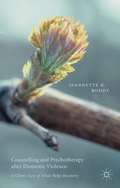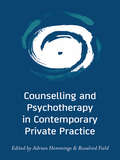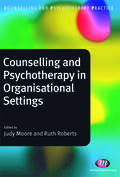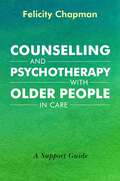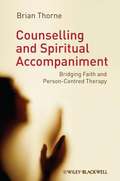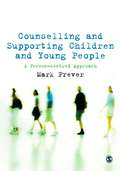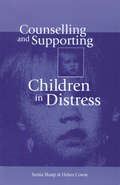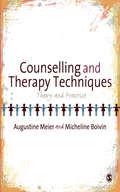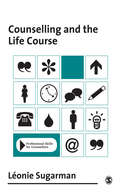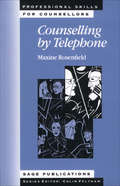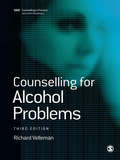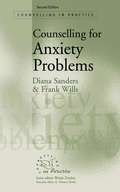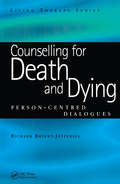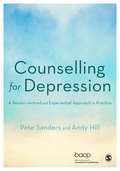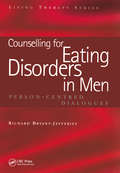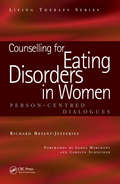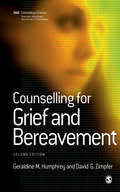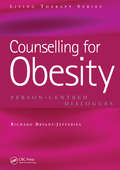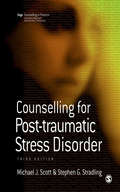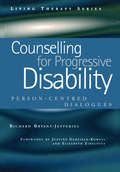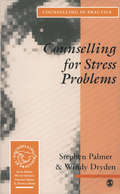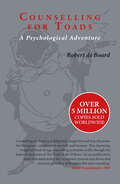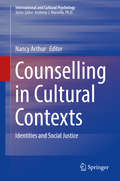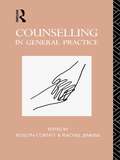- Table View
- List View
Counselling and Psychotherapy after Domestic Violence: A Client View of What Helps Recovery
by Jeannette RoddyThis is a refreshing and thought provoking book, presenting the views of female and male counselling clients about their experience of therapy after domestic violence. It brings together the existing literature and client views to present a new perspective on how to approach counselling with individuals who have experienced domestic violence.
Counselling and Psychotherapy in Contemporary Private Practice
by Rosalind Field Adrian HemmingsWhat are the dilemmas faced by counsellors and psychotherapists in contemporary private practice and how do these impact on the therapeutic relationship? Working as a counsellor or psychotherapist in contemporary private practice presents a number of clinical, ethical and philosophical dilemmas that impact on the therapeutic relationship. Counselling and Psychotherapy in Contemporary Private Practice brings together experienced contributors to explore these dilemmas, with insightful and illuminating results. This book distinguishes itself as it does not simply offer practical ideas. It also presents the reader with issues that arise from the specific context of working in independent practice and explores how these affect what takes place in the therapeutic relationship. Counselling and Psychotherapy in Contemporary Private Practice will provide essential reading for students of counselling and psychotherapy, qualified and experienced practitioners contemplating setting up in private practice. It will also be of interest to those already working in private practice, who wish to reflect upon the dilemmas that arise in this working environment.
Counselling and Psychotherapy in Organisational Settings (Counselling and Psychotherapy Practice Series)
by Judy Moore and Ruth RobertsThis book introduces some of the specific contexts in which today′s counsellors and psychotherapists find themselves working. It draws upon the experience of counsellors active in their field and uses relevant examples of the potential pitfalls and rewards of counselling in diverse institutional settings. Counsellors are introduced to the regulatory, legislative, economic, social and cultural considerations relevant to the confidential work between counsellor and client. They are also encouraged to think beyond the therapy room to the institutional context of the encounter with the client while keeping professional identity and integrity at the forefront of their work.
Counselling and Psychotherapy with Older People in Care: A Support Guide
by Felicity ChapmanThe global population is ageing rapidly yet there is a shortage of skilled professionals able to support the wellbeing of older people in care. Older people can be more vulnerable to mental health issues such as loneliness, anxiety, grief, loss, and cognitive changes, and need therapeutic support that addresses their specific needs and conditions. This supportive guide for psychotherapists, counsellors and other professionals working with older people, addresses the growing demand for mental health services for older adults. It covers a range of issues that arise within this demographic including residential living, the referral process, assessment and engagement, and attitudes towards ageing, while contextualising these issues within larger social and political frameworks. The author describes specific interventions such as Narrative Therapy, Reminiscence Therapy, Acceptance and Commitment Therapy and Cognitive Behavioural Therapy with practical case studies woven in throughout the book.
Counselling and Spiritual Accompaniment
by Brian ThorneCounselling and Spiritual Accompaniment presents the key spiritually-focused writings of Brian Thorne, one of the most influential thinkers on the convergence of spirituality with counselling, along with new material reflecting his recent work in spiritual accompaniment. Reflects the increasing focus on spiritual issues as an essential part of therapy Represents the culmination of an intellectual quest, undertaken by the most senior figure in the field, to integrate spirituality with counselling and the person-centred approach Features chapters that span thirty years of work, along with new writings that bring readers up to date with the author's most recent work in spiritual accompaniment An invaluable guide for counsellors and therapists who acknowledge the importance of spirituality to their clients, but doubt their abilities to help in this area
Counselling and Supporting Children and Young People: A Person-centred Approach
by Mark PreverCounselling and Supporting Children and Young People is the ideal introduction to counselling and supporting children and young people. Taking a person-centered approach, Mark Prever offers readers a clear understanding of the theory and practice of working with children and young people in difficulty – whether in a therapeutic, school or social work setting. This practical text: specifically addresses both the counsellor and the ‘helper’, who may be unfamiliar with counselling jargon contains exercises, points for further thought and discussion, and boxed notes throughout, highlighting exactly how the theory applies to the child or young person discusses ethics, the current political agenda and evidence-based practice This book is a must-read for trainees and professionals working with children and young people in the fields of counselling and psychotherapy, education, mental health, nursing, youth work and social work.
Counselling and Supporting Children in Distress (Children And Adolescents Ser.)
by Helen Cowie Sonia Sharp`A book which will be of great interest and use to teachers and school staff... case examples and details of interventions are very helpful... [a book for] teachers to dip into when faced with a pupil troubled by fears and phobias, or an issue such as bullying′ - Young Minds Magazine `This book successfully integrates current theory, practice and research. It is concise and easy to read.... I broadened and deepened my understanding from reading it. I can imagine some EPs and others using individual chapters as informative, quick revisions of key subject areas.... Additionally, this book will be useful to the growing army of other adults now working with children and young people′ - British Psychological Society Division of Educational and Child Psychology Newsletter Increasingly, the carers of children must call on basic counselling skills in their interactions with young people and their families. This book addresses the key issues and problems faced by adults involved in the care of children, and gives them the knowledge they need to provide effective support for the children and young people with whom they work. Integrating theory, practice and research, the authors give clear, accessible interventions designed to alleviate distress. They demonstrate how appropriate counselling approaches and support systems can be incorporated by practitioners into their existing repertoire of skills.
Counselling and Therapy Techniques: Theory & Practice
by Micheline Boivin Augustine MeierThis is the first book on counselling skills to look in detail at the practical interventions and tools used to establish the therapeutic relationship. Step-by-step, the text teaches the reader exactly how to use these skills with clients to address their concerns and achieve therapeutic change. Integrative and pluralistic in approach, the text covers the key techniques from all the major therapeutic models, placing them in their historical and theoretical contexts. Techniques covered include empathic responding, experiential focusing, Gestalt, metaphors, task-directed imagery, ego state therapy, solution focused therapy, cognitive behvioral therapy, narrative therapy and self-in-relationship therapy. The book: - presents each technique from the perspective of its underlying theory; - gives practical instruction on how to deliver each intervention; - provides extracts from counselling sessions to demonstrate the technique in action. This book is crucial reading for all trainees on counselling and psychotherapy courses or preparing to use counselling techniques in a range of other professional settings. It is also helpful for professionals who wish to acquire additional skills. Augustine Meier, certified clinical psychologist, professor Emeritus, Faculty of Human Sciences, Saint Paul University, Ottawa, Ontario and Founder and President of the Ottawa Institute for Object Relations Therapy. Micheline Boivin, certified clinical psychologist, Psychological Services of the Family, Youth and Children's Program at the Centre for Health and Social Services, Gatineau, Québec.
Counselling and the Life Course (Professional Skills for Counsellors Series)
by Dr Leonie Sugarman`Essential reading for student, fledgling and experienced counsellors alike' - Mark Edwards, Nurturing Potential `Beautifully written and well researched and full of useful structured exercise for therapists and clients, this is a combination of psychology textbook and counselling handbook - theoretical a, yet practical' - Healthcare Counselling and Psychotherapy Journal Counselling and the Life Course introduces counsellors to the concept of the life course as a multidimensional and multidisciplinary framework for thinking about clients' lives within and beyond the counselling setting. It aims to give counsellors an understanding of human development, and how it impacts practically upon their work with clients. The book engages with the tension between, on the one hand, recognizing age and life stage as important dimensions of difference, and on the other, avoiding the pitfalls of age stereotyping and ageist discrimination. At the same time, Counselling and the Life Course shows how the concept of the life course can be used as a framework for considering the commonalities between different life stages. This provides a focus for counsellors of how to draw on their existing skills and expertise when working with clients of a different age and life stage to those with whom they generally meet. The impact of both counsellor and client age on the counselling relationship is also considered. The book includes an `Activity Trail' of structured exercises in order to encourage reflection on the concepts discussed and their relevance to clients, the readers themselves, and their counselling practice.
Counselling by Telephone: SAGE Publications (Professional Skills for Counsellors Series #3)
by Maxine Rosenfield`Well written, well researched. . . [the book] contributes to undermining ideas of professional hierarchy, in which long-term face-to-face is top of the pile, and short-term and the phone are the province of the amateur who knows not what they are up to. On the contrary, the counselling process as well as the use of counselling skills are resources that can be much more widely used than is possible if they are restricted to relatively long-term counselling. This is an excellent book covering a great deal of recent thinking about confidentiality, skills, training, quality and supervision in relation to the telephone [with] a useful chapter on its technology in relation to counselling' - Counselling and Psychotherapy, The Journal of the British Association for Counselling and Psychotherapy This book explores the essential skills needed to carry out effective telephone counselling - such as welcoming and establishing a relationship with clients; listening and responding; understanding silences; working with transference and fantasy; and recognizing and reacting to feelings - which are necessarily very often distinct from those involved in face-to-face counselling. Maxine Rosenfield challenges the view that telephone counselling is a poor relation to face-to-face counselling, arguing that for certain clients it may be the therapeutic medium of choice. She examines the benefits to both clients and counsellors of working by telephone, and highlights the technical and practical issues of which counsellors should be aware. She also covers the relatively new concepts of group counselling by telephone and counselling by other media, such as e-mail or letter.
Counselling for Alcohol Problems (Therapy in Practice)
by Dr Richard D VellemanCounselling for Alcohol Problems, third edition, is a practical and bestselling guide to working with people who have problems with their use of alcohol. It is the key book recommended by most alcohol counselling courses in the UK, including the Scottish national alcohol counsellors training scheme. The author provides clear guidance for counsellors and demonstrates the need to treat every client as an individual, attempting to understand and therefore enable the client to understand, what they are doing and why. This new edition includes: - New content on the current political, social and counselling context surrounding alcohol use - A wider range of case-studies - New ideas that help students and trainees develop the skills and strategies they need for working with their clients - Further guidance for generic or non-alcohol counsellors who face alcohol problems with their clients. This third edition is an invaluable resource for practitioners, both those specialising in work with alcohol misusers and those who encounter problem drinkers in the context of a more general counselling practice.
Counselling for Anxiety Problems (Therapy in Practice)
by Diana J Sanders Frank Wills`Any cognitive therapy text which quotes from Alice in Wonderland is off to a good start - and in the case of Counselling for Anxiety Problems, it gets better and better. This is an excellent book written by counselling psychologists, aimed primarily at counselling psychologists. Diana Sanders and Frank Wills are experienced cognitive therapists, who, through various books, are performing a valuable role of building bridges between counsellors and the practice of cognitive therapists. In doing so, they lay to rest many of the misconceptions counsellors may have about cognitive therapy (often based on an 80s version of the therapy), and place particular emphasis on the central importance of therapeutic relationship in cognitive therapy, as in counselling. Their review and discussion of the anxiety disorders is comprehensive and contemporary, as indicated by the number of references from the past five years. Furthermore their clinical experience, as well as their humour, shines through. Although primarily aimed at the counselling market, it will be just as useful for therapists from a variety of backgrounds. I can thoroughly recommend this book′ - Amazon Review Anxiety is one of the most common psychological problems for which people seek help. Through research, major advances have been made in understanding the causes of anxiety, the different forms it takes and how problems perpetuate. In turn this has led to the development of more targeted ways of helping sufferers. Based on these findings, Counselling for Anxiety Problems, Second Edition presents accessible and up-to-date guidelines on the most effective ways of helping clients with anxiety problems. The authors outline general methods of working with anxiety sufferers and highlight the issues specific to this client group. Counsellors need to select appropriate interventions depending on the particular problems experienced by each client. The second part of the book therefore shows how to adapt counselling interventions to different forms of anxiety, such as: - panic - worry - agoraphobia - social and other phobias - health anxiety, and - obsessive-compulsive disorder (OCD). Whilst being cognitive in focus, the book is accessible to counsellors from different orientations who wish to broaden their understanding and skills in relation to anxiety. Based on the authors′ own clinical experience, the book makes extensive use of detailed case examples to illustrate different ways of formulating and working with anxiety. Counselling for Anxiety Problems, Second Edition is suitable for practitioners of all levels, from those in training to those with more experience who wish to update and refresh their methods of working with anxious clients.
Counselling for Death and Dying: Person-Centred Dialogues (Living Therapies Series)
by Richard Bryant-JefferiesThis book contains forewords by Sheila Haugh and Grace H Chickadonz respectively - Senior Lecturer Psychotherapy, Centre for Psychological Therapies, Leeds Metropolitan University; Center for Human Encouragement, Rochester, New York, USA. What happens to a person emotionally, psychologically and spiritually when confronted by the reality of the death of a loved one, the impending death of someone close to them, or their own death? As with the other volumes of the "Living Therapy" series, "Counselling for Death and Dying" is composed of fictitious dialogues between clients and their counsellors, and between the counsellors and their supervisors. Within the dialogues are woven the reflective thoughts and feelings of the clients, the counsellors and the supervisors, along with boxed comments on the process and references to person-centred theory. It is intended as much for experienced counsellors as it is for trainees and provides real insight into what can occur during counselling sessions. The book will also be of great value to the many health and social care professionals who, whilst they may specialise in other areas, will find that the issues dealt with in this volume have impact on the work they are doing. For them, the text demystifies what can occur in therapy, and provides useful ways of working that may be used by professionals other than counsellors. 'Richard has a deep understanding of theory and practice and has brought this understanding to this greatly neglected area in person-centred literature. [He] has the talent as a writer to honour the client, the counsellor/therapist, the supervisor and the process in all its intricacies. Richard has produced a book that, to my mind, captures the pain, the joy, the challenge of being with someone bereaved and someone facing death. The book also captures the pain and hurt and confusion of being that person who is bereaved or facing death.' - Sheila Haugh, in her Foreword. 'What is most striking about the dialogues is the realness of the feelings present in this all too human experience as lived by the clients. What is most beautiful is the relationship of acceptance shared in being in this most intimate place together as client and therapist. The healing that occurs is understandable in the strength of their connectedness.' - Grace H Chickadonz, in her Foreword.
Counselling for Depression: A Person-centred and Experiential Approach to Practice
by Pete Sanders Andy HillThis is the first book to take a humanistic - person-centred/experiential - approach to counselling to the most commonly presenting client issue, depression. A landmark text, it establishes humanistic counselling as an evidence-based psychological intervention and is essential reading for trainees wishing to work in public health settings. Chapters cover: · Evidence-based practice and person-centred and experiential therapies · Counselling for Depression competence framework · Working briefly · the Counselling for Depression therapeutic stance · In-depth case studies illustrating Counselling for Depression in practice · Training, Supervision and Research. The book further includes lists of CfD competences, research data supporting the approach, and sources used in developing the Humanistic Competence Framework This will be vital reading for those taking CfD training or a humanistic counselling and psychotherapy course, as well as for those already working within the NHS wishing to enhance their practice. Andy Hill is an accredited counsellor, an experienced trainer and Head of Research at the British Association for Counselling and Psychotherapy. Pete Sanders is retired person-centred therapist, who now acts acts as a trainer, with a special interest in Pre Therapy. He founded PCCS training and PCCS books with his wife Maggie.
Counselling for Eating Disorders in Men: Person-Centred Dialogues (Living Therapies Series)
by Richard Bryant-JefferiesAccording to the Eating Disorders Association there is a general lack of recognition of eating disorders in men, making it more difficult for male patients to access specialist services, although clients with problems connected with over-eating, under-eating, and poor eating form a significant proportion of counsellors’ lists. This book focuses on men whose eating patterns have generated side-effects on other aspects of their lives such as work, health and family. By adopting the unique approach of the Living Therapy Series, using fictitious dialogue to illustrate the person-centred approach, the reader is able to experience directly the diverse and challenging issues surrounding patients. This is difficult to achieve with conventional text books. Counselling for Eating Disorders in Men provides vital insight for trainees and experienced counsellors, as well as men suffering from eating disorders, their friends and families. It will also be of interest to members of support organisations.
Counselling for Eating Disorders in Women: A Person-Centered Dialogue (Living Therapies Series)
by Richard Bryant-JefferiesCounseling for Eating Disorders in Women focuses on women whose eating patterns have generated side-effects on other aspects of their lives such as work, health and family. Women with problems connected with over-eating, under-eating, and poor eating form a significant proportion of counselors’ lists with a distinctive set of problems and challenges. This book adopts the unique approach of the Living Therapy series, using fictitious dialogue to illustrate the person-centered approach enabling the reader to experience directly the diverse and challenging issues surrounding patients. This is difficult to achieve with conventional text books. This book is invaluable for trainees and experienced counselors, members of support organizations, and women suffering from eating disorders, their friends and families.
Counselling for Grief and Bereavement (Therapy in Practice)
by Geraldine M Humphrey David Zimpfer`The authors have done their homework in reading and consulting with the prominent literature, especially regarding children. All this effort gives the book a solid background foundation and makes it readable, and well-usable, for both lay counsellors and professional providers, and for all of us who are engaged in the delicate and rewarding endeavor of Grief Therapy′ - Naji Abi-Hashem, Clinical & Cultural Psychologist, Berkeley, California Praise for the First Edition: `The book provides an absorbing and challenging journey through the possible process involved in bereavement work, and encourages one to think broadly about how one can approach a bereaved person... this was a book I enjoyed reading very much, and which I found both theoretically sound and practically helpful′ - Bereavement Care (Cruse) Counselling for Grief and Bereavement, Second Edition is a bestselling, introductory guide for professionals who work with people experiencing bereavement through death and other forms of loss. Focusing on practical assessment and intervention strategies, Geraldine Humphrey and David Zimpfer guide readers through the essential theory and skills needed to work with clients in a way which sensitively facilitates the process of grief, initiates healing and promotes a sense of growth. Setting out the broad principles for practice, the authors go on to show how these can be applied in working with individuals, families and groups and in relation to specific issues including chronic and life-threatening illnesses, palliative care and complicated grief. Carefully chosen case examples illustrate the counselling process, while specific attention is paid throughout to ethical considerations and the possible need for referral. This fully revised and updated Second Edition features a new chapter on working with children and adolescents: both from the perspective of young people who are grieving losses and those who are receiving palliative care as patients. While focusing on the practical, the book provides a firm theoretical base by explaining key concepts such as attachment, grief and resilience. Geraldine M. Humphrey is Counsellor in the Department of Psychology at the North Canton Medical Foundation, specializing in death, illnesses, and non-death and grief. David G. Zimpfer is former Director of the Cancer Center of Ohio.
Counselling for Obesity: Person-Centred Dialogues (Living Therapies Series)
by Richard Bryant-JefferiesIn The United Kingdom over 30,000 deaths a year are caused by obesity. Counsellors, trainees and other healthcare and social care professionals need to understand and experience the diverse and challenging aspects of this rapidly developing issue. By including fictitious supervision as well as counselling sessions, Counselling for Obesity further aids professional development and gives a unique, person-centred insight into a client’s potential needs.
Counselling for Post-traumatic Stress Disorder (Therapy in Practice)
by Dr Stephen G Stradling Michael J ScottCounselling for Post-traumatic Stress Disorder, Third Edition addresses the specifics of counselling clients who have suffered major trauma, whether recently or in the past, and includes 18 detailed case examples together with transcripts of sessions. The authors' cognitive contextual approach translates the psychobiology of trauma responses into clinically useful analogies and simple drawings that guide the therapist and client. The book is unique in covering the diagnosis and treatment of the full spectrum of post-traumatic states. In this fully updated Third Edition the needs of special populations - children/adolescents, refugees and those in pain - are also addressed. Additional material includes a new PTSD screening inventory and a counselling competence scale. Counselling for Post-traumatic Stress Disorder, Third Edition is an invaluable, comprehensive aid for both the experienced and novice therapist working with trauma victims. Michael J. Scott is a Consultant Psychologist and External Examiner for the MSc Cognitive and Behavioural Psychotherapies Programme at the University of Chester. Stephen G. Stradling is Professor of Transport Psychology at Napier University.
Counselling for Progressive Disability: Person-Centred Dialogues (Living Therapies Series)
by Richard Bryant-JefferiesComing to terms with a progressive disabling disease can be a struggle, not only for the personal nature of pain, but the stressful impact that it can have on family and friends. This book sets out to provide the reader with an experience of working with a person suffering progressive disability, both in the early stages and at an advanced and more disabling stage, from a person-centred theoretical perspective. Using fictitious dialogue it provides a real insight into what can occur during counselling sessions, based on case studies at different stages of a progressive disabling disease. Reflections on the process and points for discussion are included to stimulate further thought and debate and; supervision as well as counselling is covered to aid further professional development. Counselling for Progressive Disability: person-centred dialogues will be of value to many health and social care professionals who work with people with progressive disability.
Counselling for Stress Problems (Therapy in Practice #11)
by Windy Dryden Stephen PalmerSeminars by Professor Windy Dryden. See the man live and in action. To find out more and to book your place go to www.cityminds.com _______________________________________ `A welcome addition to the series. The co-authors... have endeavoured to give a thorough and practical guide to this vast subject and they have managed to do this within the confines of an easy-to-read, cheap and relatively short paperback... a very useful practical volume for the general counsellor to have on their book shelf′ - Counselling, The Journal of the British Association for Counselling and Psychotherapy This comprehensive guide views stress counselling and management from a multimodal perspective. Clear guidelines show practitioners how they can give their clients the most effective help for their stress problems using a technically eclectic and systematic approach. The authors discuss the symptoms and causes of stress and outline a framework in which stress problems can be understood. They emphasize the importance of assessment as a guide to the selection of multimodal interventions and of tailoring the counselling approach for each client. Chapters discuss the range of interventions that can be used - cognitive, imagery, behavioural, sensory, interpersonal and health/lifestyle - and the most useful techniques that can be employed within these models, such as disputing irrational beliefs, coping imagery, psychodrama, relaxation training and assertion training. Case examples illustrate commonly used techniques.
Counselling for Toads: A Psychological Adventure
by Robert de Board'Toad', the famous character in Kenneth Grahame's The Wind in the Willows is in a very depressed state and his good friends Rat, Mole and Badger, are 'worried that he might do something silly'...First they nursed him. Then they encouraged him. Then they told him to pull himself together... Finally, Badger could stand it no longer. That admirable animal, though long on exhortation, was short on patience.'Now look here Toad, this can go on no longer', he said sternly. 'There is only one thing left. You must have counselling!'Robert de Board's engaging account of Toad's experience of counselling will capture the imagination of the growing readership of people who are interested in counselling and the counselling process. Written as a real continuation of life on the River Bank, Toad and his friends come to life all over again.Heron, the counsellor, uses the language and ideas of transactional analysis as his counselling method. Through the dialogues which make up the ten sessions, or chapters of the book, Toad learns how to analyse his own feelings and develop his emotional intelligence. He meets his 'rebellious child' and his 'adult' along the way, and by the end of the book, as debonair as ever he was, is setting out on a completely new adventure. As readers learn about Toad, so they can learn about themselves and be encouraged to take the path of psychological growth and development. Best-selling author, Robert de Board says: 'Toad's experiences are based on my own experiences of counselling people over a period of twenty years. Counselling for Toads is really an amalgamation of the many counselling sessions I have held and contains a distillation of the truths I have learnt from practice.'Appropriate for anyone approaching counselling for the first time, whether as a student or as a client, or for the professional counsellor looking for something to recommend to the hesitant, Counselling for Toads will appeal to both children and adults of all ages.
Counselling for Toads: A Psychological Adventure
by Robert de BoardOver 5 million copies sold worldwide and translated into seven languages!For over 25 years Counselling for Toads has provided readers with a warm and engaging introduction to counselling, brought to life by Toad and his friends from Kenneth Grahame’s The Wind in the Willows.Over the course of ten sessions, which correspond to chapters of the book, a very depressed Toad learns how to analyse his own feelings and develop his emotional intelligence using the language and ideas of transactional analysis. He meets his 'rebellious child' and his 'adult' along the way and by the end of the book, Toad is setting out on a completely new adventure – as debonair as he ever was.Readers will learn about the counselling process and themselves as they join Toad on his journey from psychological distress to psychological growth and development. A must-read for anyone approaching counselling for the first time, whether as a student or as a client, or for the professional counsellor looking for something to recommend to the hesitant.
Counselling in Cultural Contexts: Identities and Social Justice (International and Cultural Psychology)
by Nancy ArthurThis accessible practice-building reference establishes a clear social justice lens for providing culturally-responsive and ethical multicultural counseling for all clients. Rooted in the principles of Culture-Infused Counseling, the book’s practical framework spotlights the evolving therapeutic relationship and diverse approaches to working with clients’ personal and relational challenges, including at the community and system levels. Case studies illustrate interventions with clients across various identities from race, gender, and class to immigration status, sexuality, spirituality, and body size, emphasizing the importance of viewing client’s presenting concerns within the contexts of their lives. Chapters also model counselor self-awareness so readers can assess their strengths, identify their hidden assumptions, and evolve past basic cultural sensitivity to actively infusing social justice as an ethical stance in professional practice. Included in the chapters: · Culture-infused counseling, emphasizing context, identities, and social justice · Decolonizing and indigenous approaches · Social class awareness · Intersectionality of identities · Clients’ spiritual and religious beliefs · Weight bias as a social justice issue · Culturally responsive and socially just engagement in counselling women · Life-making in therapeutic work with transgender clients · Socially-just counseling for refugees · Multi-level systems approaches to interventions While Counseling in Cultural Contexts is geared toward a student/training audience, practicing professionals will also find the case study format of the book to be informative and stimulating.
Counselling in General Practice
by Rachel Jenkins Roslyn CorneyMany GPs now employ counsellors to help them with the psychological and emotional problems of their patients. The contributors to this book have wide experience of counsellor attachments and have been involved in developing and promoting GP counselling on a nation-wide scale. They explore the counsellor's role in general practice and investigate the issues involved, giving practical guidance which will be invaluable to those wishing to set up a counselling service.
